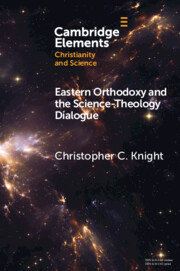Element contents
Eastern Orthodoxy and the Science-Theology Dialogue
Published online by Cambridge University Press: 21 June 2022
Summary
Keywords
- Type
- Element
- Information
- Online ISBN: 9781009106009Publisher: Cambridge University PressPrint publication: 04 August 2022
Bibliography
Primary Sources
Secondary Sources
- 3
- Cited by

